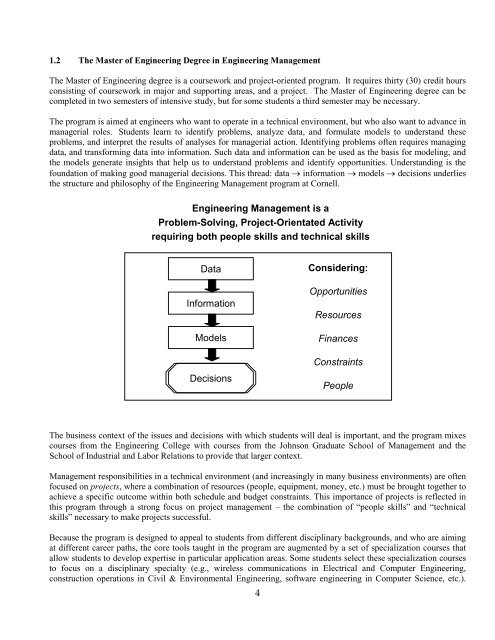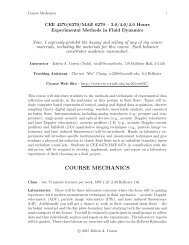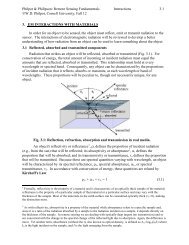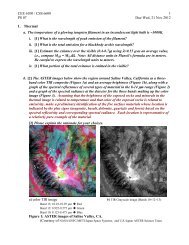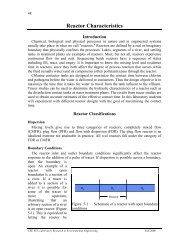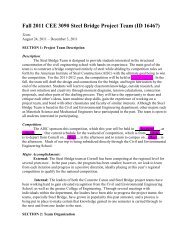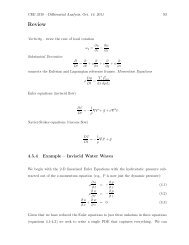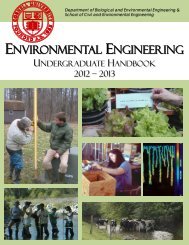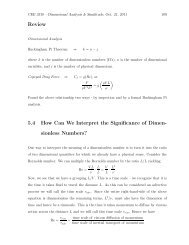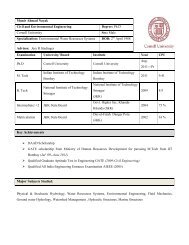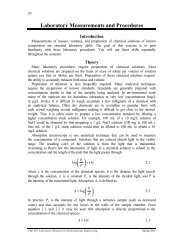Handbook 2013-14 - Civil & Environmental Engineering - Cornell ...
Handbook 2013-14 - Civil & Environmental Engineering - Cornell ...
Handbook 2013-14 - Civil & Environmental Engineering - Cornell ...
You also want an ePaper? Increase the reach of your titles
YUMPU automatically turns print PDFs into web optimized ePapers that Google loves.
1.2 The Master of <strong>Engineering</strong> Degree in <strong>Engineering</strong> Management<br />
The Master of <strong>Engineering</strong> degree is a coursework and project-oriented program. It requires thirty (30) credit hours<br />
consisting of coursework in major and supporting areas, and a project. The Master of <strong>Engineering</strong> degree can be<br />
completed in two semesters of intensive study, but for some students a third semester may be necessary.<br />
The program is aimed at engineers who want to operate in a technical environment, but who also want to advance in<br />
managerial roles. Students learn to identify problems, analyze data, and formulate models to understand these<br />
problems, and interpret the results of analyses for managerial action. Identifying problems often requires managing<br />
data, and transforming data into information. Such data and information can be used as the basis for modeling, and<br />
the models generate insights that help us to understand problems and identify opportunities. Understanding is the<br />
foundation of making good managerial decisions. This thread: data → information → models → decisions underlies<br />
the structure and philosophy of the <strong>Engineering</strong> Management program at <strong>Cornell</strong>.<br />
<strong>Engineering</strong> Management is a<br />
Problem-Solving, Project-Orientated Activity<br />
requiring both people skills and technical skills<br />
Data<br />
Information<br />
Models<br />
Decisions<br />
Considering:<br />
Opportunities<br />
Resources<br />
Finances<br />
Constraints<br />
People<br />
The business context of the issues and decisions with which students will deal is important, and the program mixes<br />
courses from the <strong>Engineering</strong> College with courses from the Johnson Graduate School of Management and the<br />
School of Industrial and Labor Relations to provide that larger context.<br />
Management responsibilities in a technical environment (and increasingly in many business environments) are often<br />
focused on projects, where a combination of resources (people, equipment, money, etc.) must be brought together to<br />
achieve a specific outcome within both schedule and budget constraints. This importance of projects is reflected in<br />
this program through a strong focus on project management – the combination of “people skills” and “technical<br />
skills” necessary to make projects successful.<br />
Because the program is designed to appeal to students from different disciplinary backgrounds, and who are aiming<br />
at different career paths, the core tools taught in the program are augmented by a set of specialization courses that<br />
allow students to develop expertise in particular application areas. Some students select these specialization courses<br />
to focus on a disciplinary specialty (e.g., wireless communications in Electrical and Computer <strong>Engineering</strong>,<br />
construction operations in <strong>Civil</strong> & <strong>Environmental</strong> <strong>Engineering</strong>, software engineering in Computer Science, etc.).<br />
4


